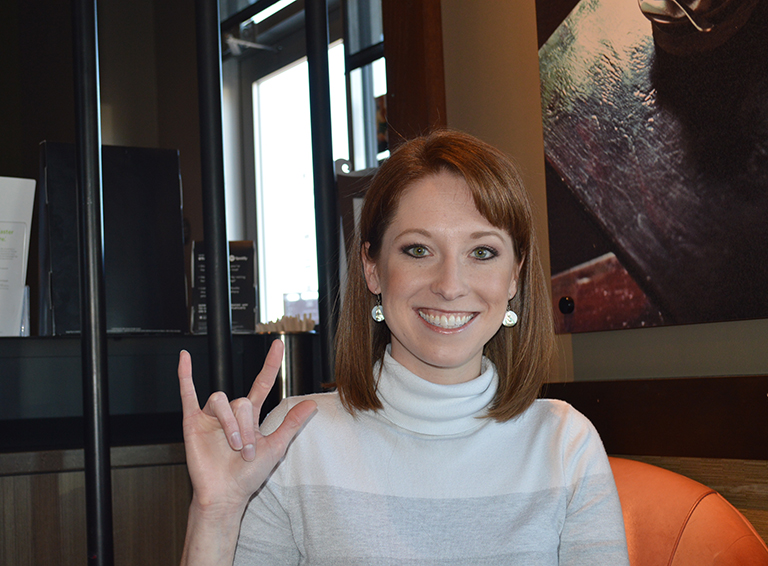Flaco Guapo Media
Story, photo reprinted with permission from Conexión San Ángelo
NOTE: This article originally was published on February 29, 2016 on Conexión's website
SAN ANGELO–"The most beautiful things in the world cannot be seen or even touched; they must be felt with the heart," Helen Keller.
In 2001 as a 17-years-old, Dana Felps entered a three-dimensional world that cannot be seen or touched—sign language. At Felps’ high school, Richland High, they offered American Sign Language (ASL) classes.
"There were other deaf students attending classes with all the other students who could hear, so I befriended some of them," she said.
The deaf community doesn’t accept just anyone but they took Felps under their wing because of her interest that went beyond simply learning their language.
Besides taking ASL classes I, II, and III, Felps became completely immersed in the deaf community to the point of attending deaf social events in downtown Fort Worth, Texas.
Later on after high school, Dana received two degrees; first an associate's degree in interpretative sign language from San Antonio College, then her bachelor's in general studies from Sul Ross State University in Alpine, Texas.
Four years ago when Felps, her husband, and now three-year-old, daughter, Cora, moved here from El Paso. Even though Felps has been doing interpretative training since 2005, it was almost three years that she decided to start her own business, West Texas Interpreting Network, LLC.
At the the time of this story, Flaco Guapo Media was working full time as its editor for Conexión San Ángelo when I met Felps at a local coffee shop for this interview. Dana spoke on misconceptions that people have about deaf people, the difficulties they experience when it comes to employment; and an ongoing battle that is prevalent regarding the rights of deaf people, despite the American Disabilities Act that was created to establish a clear and comprehensive prohibition of discrimination on the basis of disability.
“Even though the ADA was set in place in 1990, the deaf community is still fighting to have it here in San Angelo,” said Felps.
One of the misconceptions Felps sees here locally is in the area of deaf people being hired.
“A lot of employers believe that just because someone is deaf that they are unable to fulfill the requirements of the job,” she said.
Felps followed up by saying that another reason employers don’t hire deaf people is because of the communication barrier.
“But the communication barrier can be crossed over by writing notes, or even by texting out a message and showing the screen to the deaf person.”
One significant concern that Felps brought up was that many local businesses and medical facilities refuse to provide interpreting services.
While everyone loves deaf people, yet at the same time it’s become a battle to provide accommodations for this minority group here in San Angelo, Felps commented.
Felps says she believes the deaf are not being accommodated by a lot of places because they don’t want pay for it which is strange because they want the services but at the same time are not willing to pay for it.
It is required by law that an interpreter is provided where one is requested,” said Felps. If not, it is considered discrimination.”
Felps commented that doctor’s offices and businesses say it is an inconvenience for them to provide an interpreter.
“The sad part is that they don’t even know what inconvenience is—to live the life in the shoes of a deaf person who is having to fight to have combinations provided, not being able to hear, not being able to communicate with a doctor, not being able to have a job interview on a one-on-one because they have to have a third person in the room, that is an inconvenience.”
Before concluding, Felps said, “When referring to deaf people don't say hearing impaired, because that implies that they have a hearing impairment, that they are disabled," Felps said. From a deaf perspective they are not, it is just a part of who they are.”
Felps said the proper way to address that is to say they are deaf or hard of hearing. From the deaf community's perspective, they don't want to be referred to as impaired in any sense.
“I want San Angelo to see that there is a deaf community and not to view them differently—just as any other person, even though they communicate differently,” Felps concluded.
FMI on Felps’ business, call 803-505-0110; Or email her This email address is being protected from spambots. You need JavaScript enabled to view it.
To visit the website, go to http://westtexasinterpretingnetwork.com

